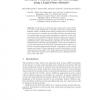Free Online Productivity Tools
i2Speak
i2Symbol
i2OCR
iTex2Img
iWeb2Print
iWeb2Shot
i2Type
iPdf2Split
iPdf2Merge
i2Bopomofo
i2Arabic
i2Style
i2Image
i2PDF
iLatex2Rtf
Sci2ools
140
click to vote
IEAAIE
2005
Springer
2005
Springer
Movement Prediction from Real-World Images Using a Liquid State Machine
Prediction is an important task in robot motor control where it is used to gain feedback for a controller. With such a self-generated feedback, which is available before sensor readings from an environment can be processed, a controller can be stabilized and thus the performance of a moving robot in a real-world environment is improved. So far, only experiments with artificially generated data have shown good results. In a sequence of experiments we evaluate whether a liquid state machine in combination with a supervised learning algorithm can be used to predict ball trajectories with input data coming from a video camera mounted on a robot participating in the RoboCup. This pre-processed video data is fed into a recurrent spiking neural network. Connections to some output neurons are trained by linear regression to predict the position of a ball in various time steps ahead. Our results support the idea that learning with a liquid state machine can be applied not only to designed data...
Related Content
| Added | 27 Jun 2010 |
| Updated | 27 Jun 2010 |
| Type | Conference |
| Year | 2005 |
| Where | IEAAIE |
| Authors | Harald Burgsteiner, Mark Kröll, Alexander Leopold, Gerald Steinbauer |
Comments (0)

